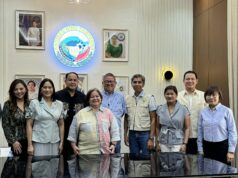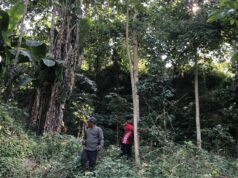ANGELES CITY – “Sudden death” from long-term exposure to foul smell, as that emitted by piggeries in nearby Porac town.
A shocking yet founded scientific revelation as cited by the Pinoy Gumising Ka Movement (PGKM) which is in solidarity with the Krusada Kontra Amoy (KKA) in demanding the removal of at least 12 prominent piggeries in Barangays Sta. Cruz and Manibaug Paralaya, Porac.
Citing the study of the US-based Hilton Kalusche of the Mississippi Safety and Environment Management Office, Sonny Dobles, head of PGKM’s environmental desk, said the piggeries release hydrogen sulfite in the air which instantly enters the body of human beings.
Dobles added that the harmful chemical accumulates “in the human body until you die or get sick of various deadly ailments.”
Among the diseases caused by hydrogen sulfide are those that affect the nervous systems and respiratory problems.
Mike Soliman, who grew up in Sta. Cruz, said “I don’t drink or smoke and I am very athletic but I always have respiratory ailments.” “Worse,” he added, “the smell in our community is so terrible I could not sleep or eat well.”
Soliman said he had wanted to transfer to other places but “no one wants to buy my house for the odor is always lurking around.”
“I think the barangay chief should ask the mayor and the town council to change the name of Sta. Cruz to something like Barangay Super Baho,” said Soliman.
Dobles, still citing the study, said “the extremely toxic, irritating gas” emitted by piggeries also reduces the oxygen-carrying capacity of human blood.
Resign!
Alarmed by the findings from Dobles’ researches, PGKM Chairman Ruperto “Perto” Cruz asked officials of the Environment and Management Bureau (EMB) in the region to resign “for not doing their job.”
“If they say they don’t know the harmful effects of foul smell, all the more should they resign as they are unfit and incompetent for their posts,” added Cruz.
Earlier, EMB officials told Punto the local government units (LGUs) and not the EMB has the capacity to close down the piggeries due to the foul smell they emit.
The EMB disclosed that they don’t have gadgets to determine if the smell is irritating or harmful.
Cruz slammed the EMB “for childish, lameduck reasoning.”
“If not the EMB officials, then who will act for and in behalf of the residents gravely affected by this very serious and dangerous health problem?” said Cruz, whose group was invited by the EMB for a dialogue on July 28.
Cruz described as “hopeless case” the administration of Porac Mayor Roger Santos.
“The mayor didn’t even lift a finger to act on the long-time problem since day one. He has no right to be elected as he is a total disservice to the people of Porac,” said Cruz.
Deadlier
Dobles, who also made a research on backyard and commercial piggeries in the country, disclosed that the waste of pigs “is ten to 100 times deadlier” than human waste.
The pathogen-based pig waste with high nitrogen content “it enters the body and affects the hemoglobin of red blood cells that carry oxygen throughout the body,” said Dobles. He added that the “it also causes gastro-intestinal diseases.”
Dobles also assailed the recent study released by the EMB on 12 Porac Piggeries: Greenfield Country Farms, Marson Hog Farm, Select Farm, Logo Farm, and Sta. Cruz Farm, all in Barangay Sta. Cruz; Villa Aida Farm, A-1 Piggery Farm, JC Farm, lO Farm, LTO Farm, and Y-Ten Live-stock Farm in Barangay Manibug-Paralaya.
Of the 12 piggeries, the EMB said, there was but one violator among the piggeries, Marson Farm, which exceeded and failed BOD standards, “having 170mg/L. The standard is set at 120/mg/L.
But the EMB has yet to penalize the Marson farm but cited that it has pending water pollution case with the Pollution Adjucitation Board (PAB).
Dobles expressed doubt over the study made by the EMB, saying not among the PGKM and KKA members had been invited during the inspection.
“They may have just taken samples from other areas. They may have used mineral water instead. Who knows what they really used because there were no credible witnesses when they did their studies,” said Dobles.
A shocking yet founded scientific revelation as cited by the Pinoy Gumising Ka Movement (PGKM) which is in solidarity with the Krusada Kontra Amoy (KKA) in demanding the removal of at least 12 prominent piggeries in Barangays Sta. Cruz and Manibaug Paralaya, Porac.
Citing the study of the US-based Hilton Kalusche of the Mississippi Safety and Environment Management Office, Sonny Dobles, head of PGKM’s environmental desk, said the piggeries release hydrogen sulfite in the air which instantly enters the body of human beings.
Dobles added that the harmful chemical accumulates “in the human body until you die or get sick of various deadly ailments.”
Among the diseases caused by hydrogen sulfide are those that affect the nervous systems and respiratory problems.
Mike Soliman, who grew up in Sta. Cruz, said “I don’t drink or smoke and I am very athletic but I always have respiratory ailments.” “Worse,” he added, “the smell in our community is so terrible I could not sleep or eat well.”
Soliman said he had wanted to transfer to other places but “no one wants to buy my house for the odor is always lurking around.”
“I think the barangay chief should ask the mayor and the town council to change the name of Sta. Cruz to something like Barangay Super Baho,” said Soliman.
Dobles, still citing the study, said “the extremely toxic, irritating gas” emitted by piggeries also reduces the oxygen-carrying capacity of human blood.
Resign!
Alarmed by the findings from Dobles’ researches, PGKM Chairman Ruperto “Perto” Cruz asked officials of the Environment and Management Bureau (EMB) in the region to resign “for not doing their job.”
“If they say they don’t know the harmful effects of foul smell, all the more should they resign as they are unfit and incompetent for their posts,” added Cruz.
Earlier, EMB officials told Punto the local government units (LGUs) and not the EMB has the capacity to close down the piggeries due to the foul smell they emit.
The EMB disclosed that they don’t have gadgets to determine if the smell is irritating or harmful.
Cruz slammed the EMB “for childish, lameduck reasoning.”
“If not the EMB officials, then who will act for and in behalf of the residents gravely affected by this very serious and dangerous health problem?” said Cruz, whose group was invited by the EMB for a dialogue on July 28.
Cruz described as “hopeless case” the administration of Porac Mayor Roger Santos.
“The mayor didn’t even lift a finger to act on the long-time problem since day one. He has no right to be elected as he is a total disservice to the people of Porac,” said Cruz.
Deadlier
Dobles, who also made a research on backyard and commercial piggeries in the country, disclosed that the waste of pigs “is ten to 100 times deadlier” than human waste.
The pathogen-based pig waste with high nitrogen content “it enters the body and affects the hemoglobin of red blood cells that carry oxygen throughout the body,” said Dobles. He added that the “it also causes gastro-intestinal diseases.”
Dobles also assailed the recent study released by the EMB on 12 Porac Piggeries: Greenfield Country Farms, Marson Hog Farm, Select Farm, Logo Farm, and Sta. Cruz Farm, all in Barangay Sta. Cruz; Villa Aida Farm, A-1 Piggery Farm, JC Farm, lO Farm, LTO Farm, and Y-Ten Live-stock Farm in Barangay Manibug-Paralaya.
Of the 12 piggeries, the EMB said, there was but one violator among the piggeries, Marson Farm, which exceeded and failed BOD standards, “having 170mg/L. The standard is set at 120/mg/L.
But the EMB has yet to penalize the Marson farm but cited that it has pending water pollution case with the Pollution Adjucitation Board (PAB).
Dobles expressed doubt over the study made by the EMB, saying not among the PGKM and KKA members had been invited during the inspection.
“They may have just taken samples from other areas. They may have used mineral water instead. Who knows what they really used because there were no credible witnesses when they did their studies,” said Dobles.




